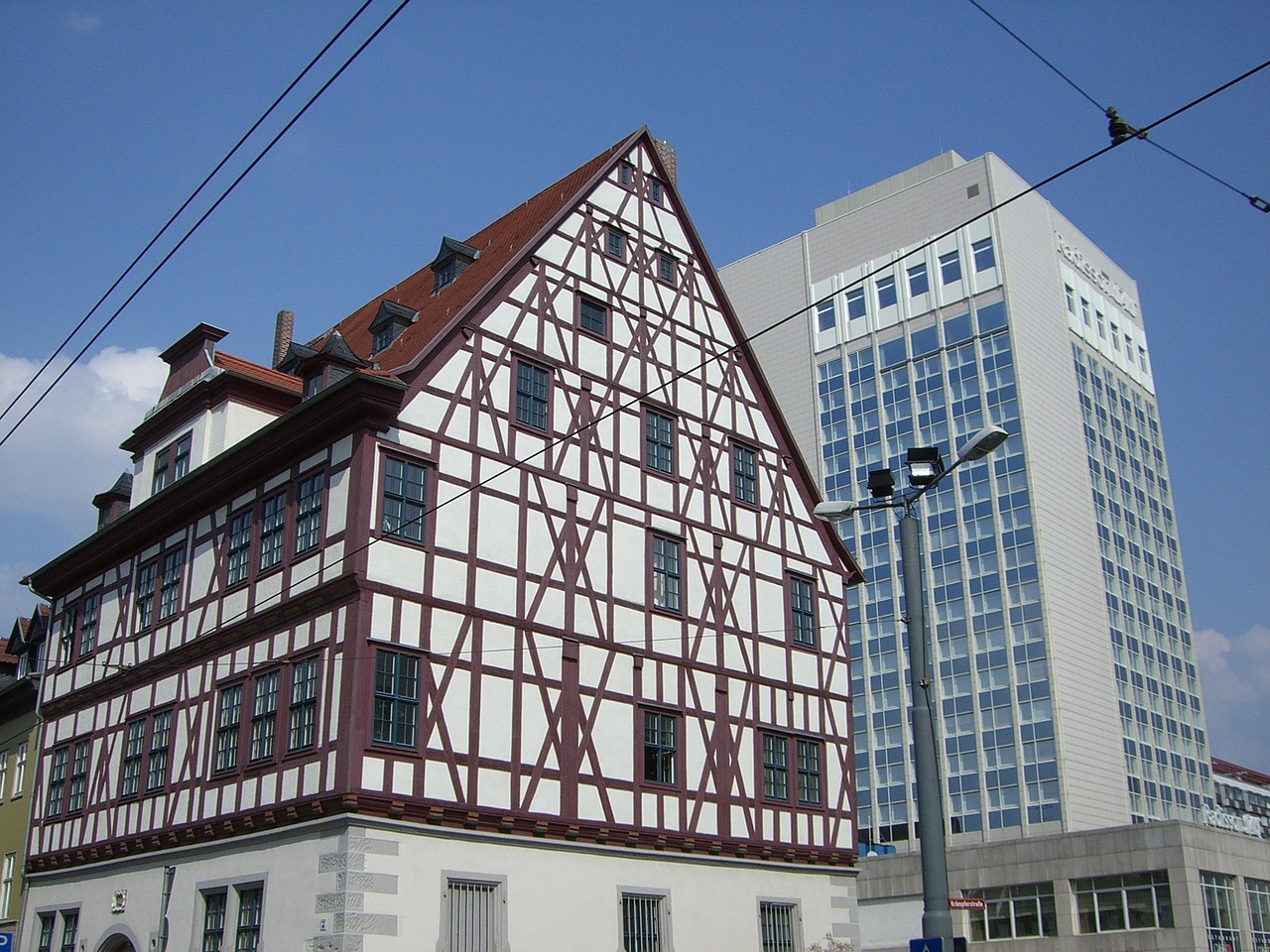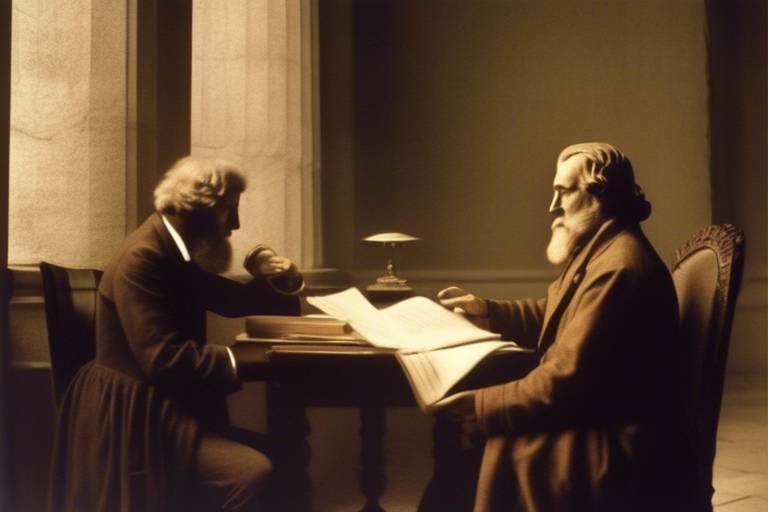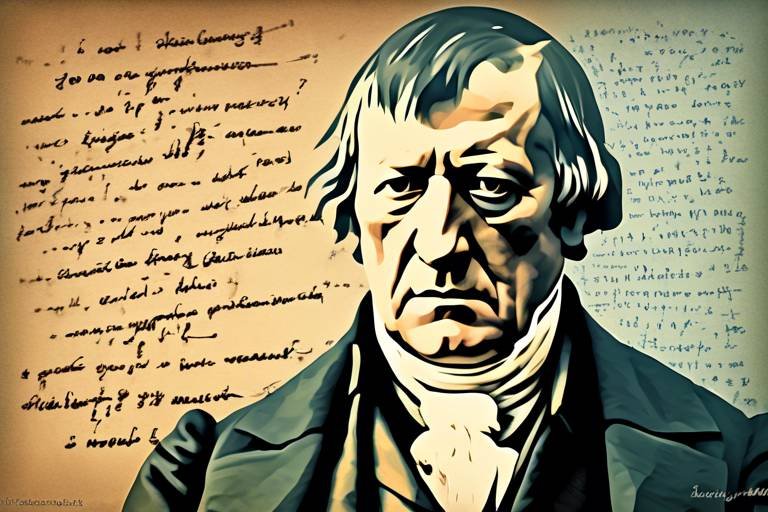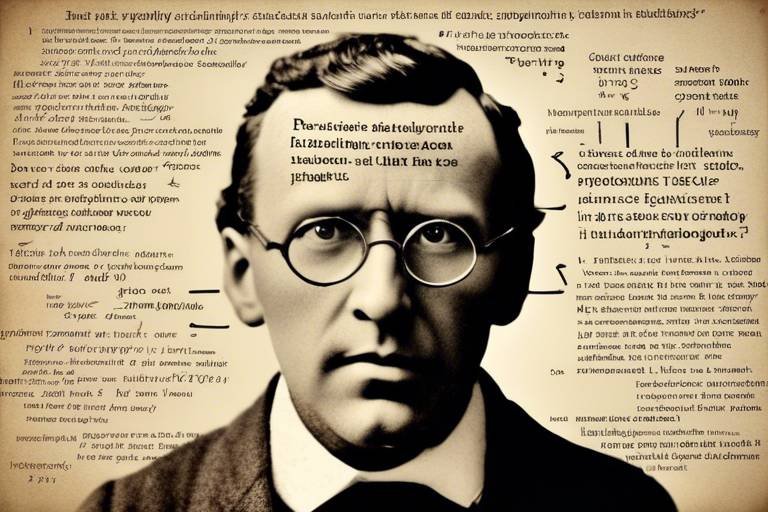Hegelian Dialectics and Modern Politics
In today's rapidly evolving political landscape, the philosophical framework of Hegelian dialectics offers a compelling lens through which we can examine the complexities of modern ideologies, conflicts, and resolutions. At its core, Hegelian dialectics is a method of understanding change and development through a triadic structure: thesis, antithesis, and synthesis. This framework not only helps us grasp the evolution of political thought but also provides insight into how opposing forces interact to shape our world.
As we navigate through various political narratives, it's essential to recognize that every ideology is a response to another. For instance, liberalism and socialism are not just isolated concepts; they are part of a dynamic dialogue where each challenges and refines the other. This ongoing conversation is not merely academic; it has real-world implications that affect our daily lives, from policy decisions to social movements. By exploring Hegelian dialectics, we can better understand how these interactions unfold and influence the political climate.
Furthermore, the relevance of Hegelian dialectics extends beyond traditional political ideologies. In contemporary politics, we witness a myriad of movements that seek to reconcile differing viewpoints, creating new syntheses that address the shortcomings of previous systems. Whether it's the rise of populism challenging established political norms or the integration of environmental concerns into economic policies, the dialectical process is at play, driving change and fostering innovation.
As we delve deeper into this article, we will explore the foundational aspects of Hegelian dialectics, its application in political ideologies, the conflicts that arise from dialectical tensions, and how modern movements utilize this framework to navigate complex social issues. By the end, we hope to illuminate the intricate dance of ideas that defines our political reality, revealing the profound impact of Hegelian thought on contemporary discourse.
So, are you ready to embark on this intellectual journey? Let’s unravel the layers of Hegelian dialectics and see how it continues to shape the world of politics today.

The Foundations of Hegelian Dialectics
At the heart of Hegelian dialectics lies a profound understanding of how ideas evolve and interact with one another. Hegel's dialectical method is often distilled into a triadic structure comprising thesis, antithesis, and synthesis. This framework serves as a lens through which we can examine the complexities of political evolution. But what exactly do these terms mean, and how do they apply to the ever-changing landscape of modern politics?
The thesis represents an initial idea or position. In the political realm, this could be a prevailing ideology, such as liberalism, advocating for individual freedom and market-driven economies. However, every thesis inevitably encounters opposition, leading to the antithesis. This is where contrasting ideas emerge, challenging the status quo. For instance, socialism may arise as an antithesis to liberalism, emphasizing collective ownership and social equity.
Now, the magic happens in the synthesis. This is not merely a compromise; rather, it’s a transformative process where elements of both the thesis and antithesis are integrated to create a new understanding or ideology. This synthesis can lead to innovative political movements that address the shortcomings of both original positions. It’s like a dance, where the thesis and antithesis engage in a dynamic interplay, resulting in a more nuanced political landscape.
To illustrate this concept further, consider the following table that summarizes the dialectical process:
| Dialectical Element | Description |
|---|---|
| Thesis | The initial idea or position; represents a dominant ideology. |
| Antithesis | The opposing idea that challenges the thesis; critiques its principles. |
| Synthesis | The resolution of the conflict between thesis and antithesis; a new understanding. |
Understanding this dialectical framework is crucial for grasping the evolution of political thought. It allows us to see how ideologies are not static; instead, they are in a constant state of flux, shaped by their interactions with opposing forces. This dynamic nature of political ideologies underscores the importance of dialogue and debate in fostering a healthy political environment.
In conclusion, the foundations of Hegelian dialectics provide a valuable perspective on the complexities of political discourse. By recognizing the interplay between thesis, antithesis, and synthesis, we can better navigate the often turbulent waters of modern politics. This understanding encourages us to engage with differing viewpoints, ultimately leading to a richer, more inclusive political dialogue.

Dialectics in Political Ideologies
When we dive into the world of political ideologies, it’s like stepping into a vast ocean, each wave representing different beliefs and values that shape our societies. At the heart of this ocean lies the concept of dialectics, a philosophical method that helps us understand the dynamic interactions between opposing ideas. In the realm of politics, dialectical reasoning serves as a powerful tool, allowing us to dissect and analyze the intricate relationships between ideologies such as liberalism and socialism. These ideologies don’t just exist in isolation; they engage in a constant dance of thesis and antithesis, shaping the political narrative and influencing the course of history.
At its core, dialectics suggests that every idea (the thesis) will inevitably face opposition (the antithesis). This clash of ideas leads to a new understanding or resolution (the synthesis). For instance, liberalism, with its emphasis on individual freedom, often finds itself challenged by socialism, which advocates for collective ownership and social equity. This back-and-forth not only enriches the political discourse but also prompts the evolution of ideologies as they adapt to criticisms and societal needs.
Let’s break it down further. Consider the following key points that illustrate how dialectical reasoning operates within political ideologies:
- Liberalism: This ideology champions personal liberties, free markets, and minimal state intervention. However, it is frequently scrutinized for its potential to foster inequality and overlook the needs of the disadvantaged.
- Socialism: As a counterpoint, socialism seeks to address these inequalities by promoting collective ownership and redistributing resources. Yet, critics argue that socialism can stifle individual initiative and lead to inefficiencies.
In this ongoing dialogue, we see how each ideology not only defends its principles but also critiques the other, creating a fertile ground for political evolution. This dialectical process is vital in shaping policies and governance models that reflect the complexities of modern societies.
Moreover, the synthesis that emerges from this dialectical conflict often manifests in hybrid ideologies. For example, many contemporary political movements advocate for a blend of liberal and socialist principles, striving to create systems that promote both individual freedoms and social welfare. This synthesis is not merely a compromise; it’s a recognition that the challenges of our time require innovative solutions that draw from the strengths of both ideologies.
In conclusion, dialectics in political ideologies is not just about opposing viewpoints; it’s about understanding how these viewpoints interact, evolve, and ultimately shape our world. By embracing this dialectical framework, we can better navigate the complexities of political discourse and work towards solutions that reflect a more comprehensive understanding of human needs and societal challenges.
- What is Hegelian dialectics? Hegelian dialectics is a philosophical method that describes the process of change and development through the interaction of opposing ideas.
- How does dialectics apply to political ideologies? Dialectics helps us understand how different political ideologies interact, critique each other, and evolve over time.
- Can dialectical reasoning lead to new political movements? Yes, dialectical reasoning often results in the synthesis of ideas, which can give rise to new political movements that address contemporary issues.

Thesis: Liberalism
Liberalism, in its essence, champions the ideals of individual freedom and the market economy. It posits that individuals should have the autonomy to make choices that affect their lives, a notion that resonates deeply in many modern democracies. This philosophical framework emerged as a reaction to the oppressive structures of feudalism and authoritarianism, advocating for rights such as free speech, equality before the law, and the protection of personal property. But what does this mean for society as a whole? In a world where personal liberties are often in conflict with collective needs, liberalism becomes a battleground of ideas, where the pursuit of individualism can sometimes clash with the demands of community and social responsibility.
At its core, liberalism is built on the belief that a free market drives innovation and prosperity. It argues that when individuals are given the freedom to pursue their economic interests, the result is a flourishing economy that benefits everyone. This idea is often illustrated through the metaphor of a garden: when each plant is given space to grow, the garden as a whole thrives. However, this metaphor also highlights a critical challenge: without careful management, some plants can overshadow others, leading to inequality. Thus, while liberalism promotes growth, it must also contend with the reality that not all individuals start from the same position of privilege.
In the political arena, liberalism faces significant challenges from various opposing ideologies. Critics often point to the shortcomings of a purely liberal approach, arguing that it can lead to social fragmentation and economic disparity. For instance, the rise of populism and nationalism in recent years can be seen as a direct response to the perceived failures of liberal policies. These movements argue that liberalism prioritizes the rights of the individual to the detriment of societal cohesion. This tension creates a rich dialectical environment where liberalism must continually adapt and respond to its critics.
Moreover, liberalism is not a monolithic ideology; it encompasses a spectrum of beliefs ranging from classical liberalism, which emphasizes limited government intervention, to social liberalism, which advocates for a more active role of the state in addressing social injustices. This diversity within liberal thought illustrates its adaptability and the ongoing debate about the best means to achieve a fair and just society. For instance, social liberals may argue that without some level of government intervention, the market can fail to provide for the basic needs of all citizens, reflecting a synthesis of liberal ideals with a recognition of social responsibilities.
As we navigate the complexities of contemporary politics, it becomes evident that liberalism is a dynamic thesis that must engage with its antitheses—whether they arise from socialism, conservatism, or other ideologies. The future of liberalism will depend on its ability to address these criticisms while maintaining its foundational principles of freedom and individual rights. In doing so, it can evolve into a more inclusive framework that seeks to reconcile individual aspirations with collective well-being.
- What is liberalism? Liberalism is a political and economic philosophy that emphasizes individual freedoms, democratic governance, and free markets.
- How does liberalism differ from socialism? While liberalism focuses on individual rights and market economies, socialism emphasizes collective ownership and social equity.
- What are the main critiques of liberalism? Critics argue that liberalism can lead to social inequality and fragmentation, prioritizing individual rights over community needs.
- Can liberalism adapt to modern challenges? Yes, liberalism is a dynamic ideology that often evolves in response to societal changes and critiques.

Critiques of Liberalism
Liberalism, often heralded as the champion of individual freedom and democratic values, has not escaped scrutiny. Critics argue that while it promotes personal liberties, it often does so at the expense of social equity and community welfare. This paradox leads to a fundamental question: can a system that prioritizes individual gain truly serve the collective good? Many thinkers, particularly from the socialist and conservative schools of thought, have raised their voices against the perceived shortcomings of liberalism.
One of the central critiques comes from the socialist perspective, which posits that liberalism's emphasis on free markets inevitably leads to inequality. In a capitalist framework, wealth tends to accumulate in the hands of a few, leaving vast segments of the population marginalized. This critique challenges the liberal assertion that market forces will self-correct and ensure equitable distribution of resources. Instead, critics argue that without intervention, the gap between the rich and the poor only widens, creating a society that is both economically and socially unstable.
Furthermore, conservatives often argue that liberalism undermines traditional values and social cohesion. They contend that the liberal focus on individual rights can lead to a breakdown of community bonds and a sense of shared responsibility. As individuals pursue their own interests, the fabric of society can fray, leading to a culture of selfishness and disconnection. This critique raises an important point: is the pursuit of personal freedom worth the potential sacrifice of communal well-being?
Critics also highlight the liberal tendency to prioritize economic growth over environmental sustainability. The relentless pursuit of profit can lead to environmental degradation, a point that has gained traction in the age of climate change. Many argue that liberalism, by focusing on short-term economic gains, neglects the long-term consequences of resource exploitation. This oversight not only threatens future generations but also raises ethical questions about our responsibilities to the planet and each other.
In response to these critiques, some liberal thinkers advocate for a more inclusive approach that seeks to address these concerns through policies that promote social justice and environmental sustainability. This leads to a fascinating synthesis of ideas, where the liberal framework adapts to incorporate elements traditionally associated with socialist and conservative thought. For instance, many modern liberal movements now emphasize the importance of universal healthcare, affordable education, and environmental protections, striving to create a more equitable society while maintaining core liberal values.
In summary, while liberalism has significantly shaped modern political thought, it is not without its flaws. The critiques from both socialist and conservative perspectives challenge its effectiveness in addressing issues of inequality, social cohesion, and environmental sustainability. As political discourse evolves, it is crucial to engage with these critiques, fostering a dialogue that may lead to a more robust and inclusive political framework.
- What are the main critiques of liberalism?
Critics argue that liberalism leads to inequality, undermines traditional values, and prioritizes economic growth over environmental sustainability. - How do socialists view liberalism?
Socialists believe that liberalism's focus on free markets results in wealth concentration and social injustice. - Can liberalism adapt to address its critiques?
Yes, many modern liberal movements are incorporating elements of social justice and environmental protection into their frameworks.

Reconciliation through Synthesis
The concept of synthesis in Hegelian dialectics plays a pivotal role in modern political discourse, acting as a bridge between conflicting ideologies. In our increasingly polarized world, where liberalism and socialism often clash, the search for a common ground becomes essential. This synthesis is not merely a compromise; rather, it represents a new understanding that transcends the limitations of both the thesis and antithesis. Imagine two rivers converging to form a more powerful current; this is the essence of synthesis in politics.
As political movements evolve, they often seek to integrate the best elements of opposing ideologies to create a cohesive and effective framework. For instance, many contemporary political parties are adopting hybrid models that incorporate aspects of both capitalism and social welfare. This is evident in various countries where policies are designed to promote economic growth while ensuring social equity. The reconciliation process can be illustrated through several key characteristics:
- Inclusivity: A synthesis approach fosters an inclusive environment where diverse perspectives are valued, encouraging dialogue and understanding.
- Pragmatism: Rather than adhering strictly to ideological purity, political actors often adopt pragmatic solutions that address real-world issues.
- Adaptability: Political movements that embrace synthesis are more adaptable to changing social dynamics, allowing for continuous evolution in response to new challenges.
Furthermore, the synthesis process often involves a dialogue between different political factions, where ideas are exchanged, debated, and refined. For example, recent political discussions around climate change have seen liberal and socialist groups come together to advocate for sustainable policies that reflect both individual responsibility and collective action. This collaboration exemplifies how synthesis can lead to innovative solutions that address pressing global issues.
However, achieving synthesis is not without its challenges. It requires a willingness to engage in difficult conversations and to confront uncomfortable truths about each ideology's shortcomings. Political leaders and activists must be prepared to navigate these complexities, often facing resistance from those who prefer to cling to traditional views. Yet, it is through this struggle that genuine progress can be made, paving the way for a more unified political landscape.
In conclusion, reconciliation through synthesis is a powerful mechanism for political evolution. By embracing the strengths of both liberalism and socialism, while acknowledging their weaknesses, societies can forge new paths that reflect a more holistic understanding of governance. As we continue to explore the dialectical nature of politics, it becomes clear that the future lies in our ability to synthesize diverse ideas into cohesive, actionable frameworks that serve the greater good.
1. What is Hegelian dialectics?
Hegelian dialectics is a philosophical framework developed by Georg Wilhelm Friedrich Hegel, which posits that the development of ideas and history occurs through a process of conflict and resolution, typically structured as thesis, antithesis, and synthesis.
2. How does synthesis apply to modern politics?
In modern politics, synthesis refers to the blending of different ideological perspectives to create new solutions that address contemporary issues, fostering collaboration and inclusivity among various political factions.
3. Can synthesis lead to effective political solutions?
Yes, synthesis can lead to effective political solutions by combining the strengths of opposing ideologies, allowing for more comprehensive approaches that address the complexities of societal challenges.
4. What are some examples of synthesis in political movements?
Examples include policies that integrate social welfare elements into capitalist frameworks, as seen in many European countries, and collaborative efforts among different political groups to tackle climate change.

Antithesis: Socialism
When we delve into the realm of political ideologies, socialism emerges as a compelling antithesis to liberalism. It champions the idea of collective ownership and social equity, advocating for a system where resources and means of production are owned and regulated by the community as a whole. This perspective is driven by a profound belief that individual success should not come at the expense of societal welfare. In essence, socialism seeks to address the inequalities that often arise in capitalist systems, where the rich get richer while the poor struggle to make ends meet.
One of the key criticisms of liberalism is its tendency to prioritize individual freedom over collective well-being. This critique is central to socialist thought, which argues that true freedom cannot exist when a significant portion of the population is marginalized or impoverished. Socialists contend that a more equitable distribution of wealth and resources is essential for creating a just society, where everyone has access to basic needs such as healthcare, education, and housing. The stark contrast between these two ideologies raises important questions about the kind of society we want to build.
In practice, socialism manifests in various forms, from democratic socialism, which seeks to implement socialist principles within a democratic framework, to more authoritarian versions that advocate for state control over all aspects of life. Regardless of the approach, the core tenets remain focused on reducing inequality and promoting social welfare. This commitment is not without its challenges, as history has shown that attempts to implement socialism can lead to significant political and economic upheaval. For instance, the collapse of the Soviet Union serves as a cautionary tale about the dangers of extreme state control and the suppression of individual freedoms.
Moreover, socialism's critique of capitalism is not merely theoretical; it has practical implications that resonate in today’s political discourse. For instance, the rise of movements advocating for universal basic income, healthcare for all, and environmental justice can be seen as a response to the failures of capitalist systems to address the needs of the many. These movements often draw on socialist principles to argue for systemic change, emphasizing that the current economic model is unsustainable and inequitable.
In summary, socialism stands as a powerful antithesis to liberalism, advocating for a paradigm where collective well-being takes precedence over individual gain. As we navigate the complexities of modern politics, understanding the dynamics between these ideologies is crucial. The ongoing dialogue between liberal and socialist thought not only shapes political narratives but also influences the policies that govern our lives. As society continues to grapple with issues of inequality and justice, the relevance of socialism in contemporary discourse remains undeniable.
- What is socialism? - Socialism is a political and economic ideology that advocates for collective ownership of the means of production and aims to reduce inequality within society.
- How does socialism differ from liberalism? - While liberalism emphasizes individual freedom and market economy, socialism prioritizes social equity and collective well-being, often critiquing the disparities created by capitalism.
- What are some modern examples of socialist policies? - Modern examples include universal healthcare, free education, and policies aimed at reducing income inequality, such as progressive taxation.
- Can socialism coexist with democracy? - Yes, democratic socialism seeks to implement socialist principles within a democratic framework, allowing for political pluralism and civil liberties.

Dialectical Conflicts in Politics
Dialectical conflicts in politics are like a never-ending tug-of-war, where opposing ideologies pull in different directions, each trying to assert its dominance. This dynamic interplay is not just a theoretical concept; it actively shapes the political landscape we navigate today. At its core, dialectical conflict emerges from the clash between a thesis and its antithesis, leading to a synthesis that can redefine political ideologies and practices.
To illustrate this, let’s consider the ongoing debates surrounding climate change. On one side, you have the proponents of aggressive environmental regulations (the thesis), advocating for immediate action to combat climate change. On the opposite end, there are those who prioritize economic growth and argue against stringent regulations (the antithesis). This conflict creates a dialectical tension that drives political discourse, forcing both sides to confront their beliefs, adapt, and often, find common ground in a new synthesis—such as a green economy that balances environmental concerns with economic viability.
Moreover, these conflicts are not isolated incidents; they reflect a broader pattern in political evolution. For example, in the United States, the rise of populism can be seen as a reaction to traditional political structures. The populist movement (antithesis) challenges established parties (thesis), leading to a synthesis that may redefine political alliances and voter bases. This ongoing cycle of conflict and resolution is crucial for understanding how societies evolve and adapt to new challenges.
Dialectical conflicts also manifest in various forms, including:
- Social Movements: Grassroots movements often emerge as a response to perceived injustices, challenging the status quo and advocating for change.
- Legislative Battles: Conflicts in legislative bodies, where different factions debate and negotiate policies, often illustrate the dialectical process in action.
- International Relations: The tension between nations can be viewed through a dialectical lens, where conflicts lead to negotiations and treaties that reshape global politics.
In essence, dialectical conflicts are not merely obstacles; they are essential drivers of political change. They compel us to question our assumptions, engage in dialogue, and ultimately, seek resolutions that reflect a more nuanced understanding of complex issues. This process is vital for the health of any democracy, as it fosters a culture of debate and compromise, allowing for the emergence of innovative solutions that can address the needs of a diverse populace.
As we move forward, recognizing the importance of these conflicts will enable us to navigate the complexities of modern politics more effectively. By embracing the dialectical method, we can transform conflicts into opportunities for growth, understanding, and progress.
What is dialectical conflict?
Dialectical conflict refers to the struggle between opposing forces or ideologies that leads to a new understanding or synthesis. It is a dynamic process that drives political change.
How does dialectical reasoning apply to modern politics?
Dialectical reasoning helps us understand the interactions between competing political ideologies, allowing for constructive dialogue and the development of hybrid solutions that address societal issues.
Can you give an example of dialectical conflict in politics?
An example of dialectical conflict is the debate over climate change policies, where environmental advocates and economic conservatives clash, resulting in new approaches that seek to balance both concerns.

Case Studies of Political Conflict
When we dive into the realm of political conflicts, it’s fascinating to see how Hegelian dialectics plays out in real-world scenarios. These conflicts often present a vivid illustration of the interplay between thesis and antithesis, leading to resolutions that can redefine political landscapes. Let’s explore a few notable case studies that highlight these dynamics.
One of the most striking examples is the American Civil Rights Movement of the 1960s. Here, the thesis was the prevailing social order that upheld racial segregation and discrimination, while the antithesis emerged in the form of activists advocating for equal rights. Figures like Martin Luther King Jr. and Malcolm X represented this antithesis, challenging the status quo and demanding change. The synthesis of these conflicting ideas ultimately led to significant legislative reforms, such as the Civil Rights Act of 1964, which aimed to dismantle institutional racism and promote equality.
Another poignant case study is the Brexit referendum in the United Kingdom. The thesis represented the European Union's collective governance and the benefits of membership, while the antithesis arose from a significant portion of the population advocating for national sovereignty and control over immigration. The heated debates that ensued illustrated the dialectical tension at play, culminating in the decision to leave the EU. This conflict did not just end with the vote; it has continued to evolve, as both sides grapple with the implications of this synthesis on the UK’s political and economic landscape.
To further illustrate the dialectical nature of political conflicts, we can look at the ongoing tensions in the Middle East, particularly the Israeli-Palestinian conflict. The thesis here could be seen as the establishment of the state of Israel, which was founded on the principle of a Jewish homeland. The antithesis, however, is the Palestinian claim to the same land, rooted in a desire for self-determination and statehood. This conflict has persisted for decades, with numerous attempts at peace negotiations representing efforts at synthesis. Yet, each attempt often reveals deeper underlying issues, showcasing the complexity of resolving such entrenched conflicts.
In these case studies, we see a clear pattern where the dialectical method sheds light on the forces at play. It’s not just about opposing sides clashing; it’s about understanding how these conflicts drive societal change. The resolution often leads to a new synthesis, which can create a more nuanced political environment. This is evident in the way societies continue to grapple with the outcomes of these conflicts, seeking to address the needs and concerns of both sides.
In conclusion, examining political conflicts through the lens of Hegelian dialectics not only helps us understand the dynamics involved but also encourages us to think critically about the resolutions that emerge. Each case study serves as a reminder that political discourse is rarely black and white; instead, it’s a complex interplay of ideas that evolve over time.
- What is Hegelian dialectics?
Hegelian dialectics is a philosophical framework that explains the development of ideas through a triadic structure: thesis, antithesis, and synthesis. - How does dialectics apply to modern politics?
Dialectics helps us understand the conflicts and resolutions that shape political ideologies and movements today. - Can you give an example of dialectics in action?
Yes! The American Civil Rights Movement is a prime example where the struggle between segregation (thesis) and equality (antithesis) led to significant changes in laws and society.

Resolution and Synthesis in Politics
In the tumultuous world of politics, the concept of resolution and synthesis holds a significant place. It's like navigating a stormy sea; while the waves of conflicting ideologies crash against each other, the potential for a calmer horizon exists. Resolution refers to the process of addressing and resolving these conflicts, while synthesis represents the creation of a new understanding or framework that incorporates elements from both sides. This dynamic interplay not only shapes policies but also influences societal values and norms.
When we think about resolution in political contexts, it becomes clear that it often requires compromise. Imagine two neighbors who can't agree on a fence. One wants a tall barrier for privacy, while the other prefers an open view. Through dialogue, they might come to a resolution by agreeing on a fence that is both decorative and functional, allowing some visibility while maintaining a sense of separation. In politics, this is akin to finding a middle ground between competing ideologies. For instance, in the debate over healthcare, liberal perspectives advocating for universal coverage may find common ground with conservative views emphasizing personal choice, leading to hybrid systems that blend public and private options.
Moreover, synthesis in politics can lead to innovative solutions that transcend traditional boundaries. It’s not merely about finding a compromise; it’s about creating something entirely new that reflects the best aspects of both positions. For example, the rise of social democracy in many Western countries illustrates how a synthesis of capitalist and socialist principles can create a robust welfare state that promotes economic growth while ensuring social equity. This new political model addresses the shortcomings of both pure capitalism and socialism, illustrating how synthesis can lead to a more harmonious and functional society.
However, achieving resolution and synthesis is often easier said than done. The path is fraught with challenges, including deep-seated ideological divides and the influence of special interest groups. The political landscape is often polarized, making it difficult for opposing factions to engage in constructive dialogue. Yet, history shows us that when leaders and citizens alike are willing to embrace the dialectical process—acknowledging the validity of opposing viewpoints—meaningful progress can occur.
To illustrate this point, consider the recent political movements advocating for climate action. Initially, environmentalists and industrialists appeared to be at odds, with one side pushing for stringent regulations and the other resisting change due to economic concerns. However, through the dialectical process, a synthesis has emerged: green technology investments that both protect the environment and stimulate economic growth. This is a prime example of how resolution and synthesis can lead to innovative solutions that benefit society as a whole.
In conclusion, the concepts of resolution and synthesis in politics are essential for fostering cooperation and progress in a world filled with diverse perspectives. By embracing the dialectical method, we can navigate the complexities of modern governance and create political landscapes that reflect a more inclusive and dynamic society. The challenge lies in our willingness to engage with opposing views, recognizing that through conflict, we can discover pathways to resolution that ultimately lead us to a brighter future.
- What is Hegelian dialectics? Hegelian dialectics is a philosophical framework that involves the process of thesis, antithesis, and synthesis to understand the evolution of ideas and conflicts.
- How does resolution occur in political contexts? Resolution in politics often involves compromise and dialogue between opposing ideologies, leading to agreements that address the concerns of both sides.
- What is an example of synthesis in modern politics? An example of synthesis is the emergence of social democracy, which combines elements of capitalism and socialism to create a balanced political framework.
- Why is synthesis important in politics? Synthesis is important because it allows for innovative solutions that can address complex social issues by integrating diverse perspectives.

Modern Applications of Hegelian Dialectics
In today's fast-paced and often fragmented political landscape, the application of Hegelian dialectics has become increasingly relevant. This philosophical framework, which emphasizes the dynamic interplay between opposing ideas, provides a valuable lens through which we can understand and navigate complex social issues. By recognizing the importance of thesis, antithesis, and synthesis, modern political movements can foster dialogue and create more inclusive solutions that reflect the diverse needs of society.
One of the most striking applications of Hegelian dialectics is seen in the realm of social justice movements. For instance, movements advocating for racial equality often start with a thesis that underscores the importance of equal rights. The antithesis emerges from systemic inequalities that challenge this notion, leading to protests and calls for reform. Through this dialectical process, a synthesis can occur, resulting in policies that not only address the immediate concerns but also pave the way for a more equitable society. This synthesis is not merely a compromise; it represents a deeper understanding of the issues at hand and a commitment to resolving them holistically.
Moreover, the rise of environmental activism showcases another dimension of Hegelian dialectics in modern politics. Here, the thesis might be the belief in economic growth and industrial progress. The antithesis, however, arises from the environmental degradation and climate change that threaten our planet. Activists and policymakers are increasingly recognizing that a synthesis is necessary—one that balances economic development with environmental sustainability. This approach not only promotes a healthier planet but also encourages innovation in green technologies, demonstrating how dialectical reasoning can lead to transformative change.
In addition, political parties are beginning to embrace dialectical thinking to address internal divisions. Rather than viewing dissent as a threat, parties are recognizing that differing perspectives can enrich their platforms. By engaging in dialectical discussions, they can identify a common ground that allows for a more comprehensive approach to governance. This can take the form of coalition-building, where diverse groups come together to form a united front, or through policy debates that incorporate a range of viewpoints, ultimately leading to more robust and effective solutions.
Furthermore, the digital age has amplified the relevance of Hegelian dialectics. Social media platforms serve as arenas for the clash of ideas, where various political ideologies are constantly tested against one another. This rapid exchange of information can lead to heightened tensions, but it also provides an opportunity for synthesis. Online dialogues can foster understanding and collaboration, allowing individuals to move beyond polarizing rhetoric and towards constructive conversations. In this sense, the internet acts as a modern-day dialectical stage, where the synthesis of ideas can emerge from the chaos of conflicting viewpoints.
As we look to the future, the potential for Hegelian dialectics to inform political discourse is immense. It encourages a culture of dialogue and understanding, essential components for resolving contemporary issues. By embracing this philosophical approach, we can cultivate a political environment that values complexity and seeks to unify rather than divide. The challenge lies in recognizing the importance of this dialectical process and committing to the hard work of synthesis, which ultimately leads to the evolution of our political landscape.
- What is Hegelian dialectics? Hegelian dialectics is a philosophical framework developed by Georg Wilhelm Friedrich Hegel that emphasizes the process of development through the conflict of opposites, typically structured as thesis, antithesis, and synthesis.
- How can Hegelian dialectics be applied in modern politics? It can be applied by facilitating dialogue between opposing political ideologies, fostering understanding, and creating policies that address the needs of diverse groups.
- Why is synthesis important in political discourse? Synthesis is crucial as it represents a resolution that transcends the conflict between opposing ideas, leading to more comprehensive and effective solutions.
Frequently Asked Questions
- What is Hegelian dialectics?
Hegelian dialectics is a philosophical framework developed by Georg Wilhelm Friedrich Hegel that explains the development of ideas and realities through a triadic structure: thesis, antithesis, and synthesis. This method illustrates how contradictions in thought and society can lead to progress and deeper understanding.
- How does Hegelian dialectics apply to modern politics?
In contemporary politics, Hegelian dialectics helps to analyze the dynamic interplay between various ideologies, such as liberalism and socialism. It shows how these opposing views can lead to conflicts, which ultimately drive political evolution and the emergence of new ideas or systems that blend elements from both sides.
- Can you explain the thesis-antithesis-synthesis model?
Sure! The model begins with a thesis, which represents an initial idea or position. The antithesis arises as a reaction or contradiction to the thesis, often challenging its validity. Finally, the synthesis emerges as a resolution that reconciles the two, leading to a new understanding or perspective that incorporates aspects of both the thesis and antithesis.
- What role do dialectical conflicts play in politics?
Dialectical conflicts are crucial in politics as they highlight the tensions between opposing ideologies and interests. These conflicts can lead to significant social changes, as they force societies to confront contradictions and seek resolutions that can redefine political landscapes and foster progress.
- How do modern political movements use Hegelian dialectics?
Modern political movements utilize Hegelian dialectics to navigate complex social issues by promoting dialogue between differing perspectives. This approach encourages understanding and cooperation, allowing for the development of hybrid systems that address the limitations of traditional ideologies.
- Are there real-world examples of Hegelian dialectics in action?
Yes! Many political conflicts, such as those between liberal and socialist movements, illustrate Hegelian dialectics. For instance, the rise of social democracy in various countries represents a synthesis of liberal and socialist ideas, aiming to create a more equitable society while preserving individual freedoms.
- What is the significance of synthesis in political discourse?
Synthesis is significant in political discourse as it represents a way to move beyond binary oppositions. By finding common ground between conflicting ideologies, synthesis can lead to innovative solutions that reflect a more comprehensive understanding of societal needs and aspirations.



















